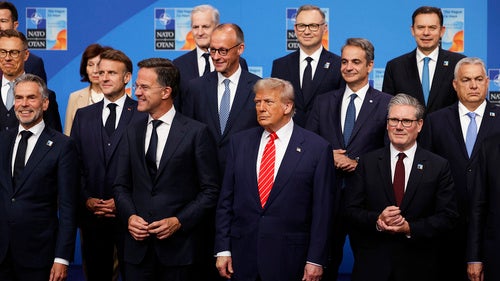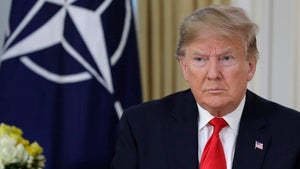A Crisis in Confidence: European Public Opinion in the Trump Era

European perception of the United States has plummeted as multilateral commitments wane and international tensions rise, recent surveys show.
European public perceptions of the United States have declined in the wake of Donald Trump's second term as US president, according to recent polling. With reasons ranging from questions about Trump’s commitment to democracy, to US policy reversals in the Russia-Ukraine War, to US-imposed economic sanctions, Europeans now largely consider Trump’s United States a threat to peace in the world.
While press reporting has focused attention mainly on Trump's aggressive tariff policies, the White House has also taken measures to distance the United States from its multilateral commitments and to cease longstanding memberships in international liberal institutions. Since his inauguration, Trump has withdrawn from the World Health Organization (WHO), United Nations Human Rights Council (UNHRC), Paris Climate Agreement, Loss and Damage Fund, and others. He has also expressed the desire to distance the United States from NATO, the International Criminal Court (ICC), and various smaller interstate organizations.
Recent polling shows that Europeans are widely concerned and frustrated with the new Trump administration’s international political and economic conduct and seem prepared to brace for a future without the United States as a trusted partner.
European Opinion of the United States Plummets After Trump Reelection
A survey conducted by YouGov, fielded February 5-18, 2025, found that European favorability of the United States has fallen markedly since the election of Donald Trump. Across seven countries—Great Britain, France, Germany, Denmark, Sweden, Spain, and Italy—favorability of the United States dropped by roughly 8 percentage points since November 2024. This decline is especially pronounced in northern Europe, with a drop of 20 percentage points in Denmark and 12 percentage points in Sweden.
This growing disapproval of the United States among Europeans parallels their unfavorable view of Trump. A YouGov survey of European adults, fielded February 25-March 4, 2025, reports that 58 percent of Britons, French, Italians, and Spaniards have a very unfavorable opinion of Trump and 16 percent a somewhat unfavorable opinion, while just two in 10 (19%) harbor a favorable opinion. European confidence in Trump also remains low, says a joint survey conducted by Le Grand Continent and Cluster 17. This March 2025 poll reports that Trump’s confidence rating among Europeans is the second-lowest among the 14 international leaders listed. On a scale of 0 to 10, with 0 representing no trust and 10 representing complete trust, Trump scores an average rating of 2.6. The only leader with a lower score is Russian President Vladimir Putin, who receives an average score of 1.5. This lack of confidence reflects a direct concern with the domestic consequences of Trump’s conduct. A plurality (43%) believe that Trump’s actions will have a negative effect on the respondent’s country.
Trump’s unpopularity among Europeans extends beyond just broad unfavorability and low confidence. According to the same February YouGov poll, three-quarters of Europeans (73%) view Trump as a threat to peace and security in Europe, just 9 percentage points behind Putin (82%).
Similarly, the Le Grand Continent/Cluster 17 survey highlights that about half (51%) of respondents consider Trump an enemy of Europe and an additional six in 10 (63%) believe that Trump’s election makes the world less safe. This perceived lack of safety seems to reflect a dwindling faith in the United States’ multilateral commitments. A large majority (70%) agree that the EU would have to rely on its own forces to ensure security and defense, with only one in 10 (10%) trusting Trump’s United States with defensive responsibilities.
To many Europeans, Trump’s reelection seems to mark a turn away from democracy. When asked about their views toward the US president, a plurality (43%) believe that Trump has authoritarian tendencies and 39 percent consider him an outright dictator. By contrast, only one in 10 Europeans (13%) contend that Trump respects democratic principles.
Europeans Broadly Support Retaliatory Tariffs
Since Trump's reelection, some in his administration have veered toward trade protectionism and distrust of established US allies. In March of 2025, the United States suspended its financial contributions to the World Trade Organization (WTO). Come April 2, tensions only escalated, with Trump’s “Liberation Day” marking the introduction of universal tariffs and a “reciprocal tariff” policy. The European Union (EU), in particular, was subject to a 20 percent tariff on top of the universal 10 percent tariff.
In response, the EU first imposed retaliatory tariffs targeting $23 billion in US goods with implementation scheduled to begin on April 15, 2025. The EU executive committee declared, “The EU considers US tariffs unjustified and damaging, causing economic harm to both sides, as well as the global economy.” This imposition was short-lived, however, as the EU suspended its tariffs on April 10, citing a desire to mitigate tensions through negotiation.
The austere economic measures may have sparked further public disapproval of the United States and antagonism toward Trump. According to a YouGov Survey, fielded March 6-24, 2025, a majority (69%) of Danish, French, German, Italian, Spanish, Swedish, and British publics support retaliatory tariffs against the United States.
Despite the turbulence caused by economically austere measures, Europe has remained resilient. Vanguard FTSE Europe ETF (VGK), an investment fund that tracks the performance of European stocks, reported an increase in net inflows and 14 percent year-to-date gain, both of which indicate that European markets have remained stable. European publics seem to be bracing for negative impacts, however.
YouGov reports that a sizable majority (70%) from the same seven countries expect US tariffs to have a notable impact on the EU economy, with 19 percent of respondents expecting a very large impact. This trend holds when considering the economies of single countries alongside the European Union. When asked about the expected economic impact of US tariffs on the respondent’s country, 66 percent anticipate notable ramifications. In step, pessimism regarding domestic economies has only increased. In December 2024, 46 percent expected their country’s economy to worsen in the next year, but that number has now increased by 4 percentage points to 50 percent as of March 2025.
Data also suggests that the downturn in US favorability could be linked to the Trump administration’s criticism of the EU. While Trump has chastised the EU for being unfair in its trade dealings with the United States, Europeans disagree. Instead, more than half (51%) assert that the EU has been fair in its economic dealings with the United States (12% say unfair).
Similarly, a PollingEurope survey of all 27 EU countries found that two-thirds (67%) of respondents support the imposition of counter tariffs. This backing of retaliatory tariffs may reflect concerns over domestic economic instability. Four in ten (41%) Europeans view the increase of inflation and prices as the most worrying threat, with another two in 10 (24%) considering the possibility of a new economic crisis the most worrying.
Europeans Sense a Bias Toward Russia on Part of Trump Administration
Beyond economic factors, the Trump administration’s shift in policy toward the Russia-Ukraine war has likely contributed to the growing European resentment of the United States. In March of 2025, Trump worked to broker a temporary ceasefire between Ukraine and Russia. According to a February-March YouGov survey, Europeans seem to view such negotiating moves as particularly advantageous for Russia, with more than half (57%) believing a peace treaty negotiated between Trump and Putin on the Ukraine conflict would be better for Russia. Since Europeans tend to support Ukraine (65%), US moves that benefit Russia may be cause for overall European disapproval of the United States.
If, however, peace negotiations between the United States and Russia were to begin, Europeans tend to lack faith that such a resolution would result in a reset to the pre-2022 distribution of territory. More than six in 10 (66%) Europeans consider it likely that a peace deal agreed between the United States and Russia will leave Russia in control of some areas of Ukraine it has seized since 2022, according to a YouGov poll in four European countries. Beyond their opinions on the likelihood of such a peace deal, a plurality (46%) of Europeans maintain a negative moral view on a resolution that leaves Russia in control of territory previously held by Ukraine (25% neither positive nor negative, 14% positive).
Peace negotiations between Russia and the United States that exclude Ukraine are similarly unpopular. A large majority (69%) of Britons, French, Italian, and Spanish publics view the exclusion of Ukraine in peace talks negotiated by the United States and Russia as unacceptable.
Conclusion
The future of US-European relations will likely depend on the resilience, stability, and coordination of European multilateral institutions and the agency of European leaders immersed in crisis. The recently changing position of the US administration in helping Europe assist Ukraine militarily might defuse some tensions, though it is clear that many European leaders recognize they can no longer rely solely on the United States for their defense. It is unclear if Europe is ready to bear the costs of cutting ties with the United States, but leaders now see the need to prepare in case of a US pullback or separation, however costly.
European public opinion predicts such a separated future, with optimism and trust vis-á-vis the United States declining precipitously. Whether this fracture becomes permanent or is only a feature of the second Trump administration remains to be seen, hinging on domestic political decisions in the United States and Europe and multilateral policy choices.


Related Content
 Public Opinion
Public Opinion
The gap between Democrats and Republicans on America's NATO commitment has reached an all-time high in Council polling dating back to 1974.
 Public Opinion
Public Opinion
While down slightly from last year, more than half support continuing military and economic assistance to Kyiv. But the results are highly partisan.
 Public Opinion
Public Opinion
While most support providing medevac services to injured peacekeepers, the public is divided over backing a peacekeeping force militarily.